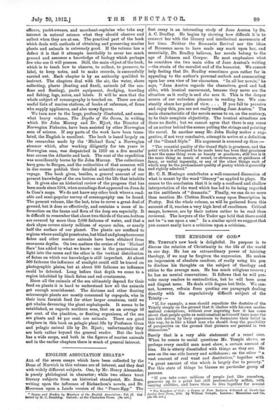THE KINGDOM OF GOD.* Mn. TEMPLE'S new book is delightful
Its purpose is to discuss the relation of Christianity to the life of the world in our day. He has an extraordinary power of laicizing theology, if we may be forgiven the expression. He makes an impression of absolute candour, of really using his pen to disclose his thoughts on the subject of theology and ethics to the average man. He has much religious reserve ; he has no mental reservations. It follows that he will pro-
voke many readers to contradiction, but he will bore none and disgust none. He deals with dogma but little. We can-
not, however, refrain from quoting one paragraph dealing directly with the superlatively difficult subject of the Trinity : — "If, for example, a man should repudiate the doctrine of the Trinity simply on the ground that it clashes with his own mathe- matical conceptions, without ever inquiring how it has come about that people quite as mathematical as himself have none the less felt driven by their experience to formulate their belief in this way, he is like a blind man who should deny the possibility of perspective on the ground that pictures are painted in two dimensions."
Surely that is a very able statement of a vexed case.
-When he comes to social questions Mr. Temple shows, as perhaps every candid man must show, a certain amount of bias. He is utterly dissatisfied with things as they are. He sees on the one side luxury and selfishness ; on the other "a. vast amount of real want and destitution," together with "a great amount of vice which is largely due to poverty." For this state of things he blames no particular group of
persons.
"If you take some millions of people just Mrs ourselves, generous up to a point but still predominately selfish, with varying abilities, and leave thorn to live together for several • The Kingdom's of God : a Course of Pour Lectures delivered at Ctunbridge during Lent Term, 1912, By William Temple. London : Macmillan and Co. [20. 65. net.]
generations, the result will be something like the horror of our present European civilization. The sin that has made it is just our sin. That is what our sort of character works out at if you leave it alone."
He believes that there are at present not enough practizing Christians to make a Christian atmosphere, and he hints that outside such an atmosphere no perfectly Christian life can exist. "We are only as Christian as the influence of England
will let us be." We are still in the fetters of "our still half- pagan civilization." Mr. Temple hates war as strongly as any Quaker, but he counsels every man who has done his best to arrest it to fight when war is declared or take measures to get himself shot as a, mutineer ! As a counsel of perfection— or shall we say as a code of perfection F—he upholds the belief that Christian ethics must finally apply between nations as between individuals.
"I pass on to international relationships. The Christian nation will, I think, be prepared to defend by force others who are being oppressed ; but, so far as its own interest is concerned, it will choose rather to perish than to stain its soul by the passion of war. Nor do I believe that until some nation has done this there will be any hope of international civilization."







































 Previous page
Previous page